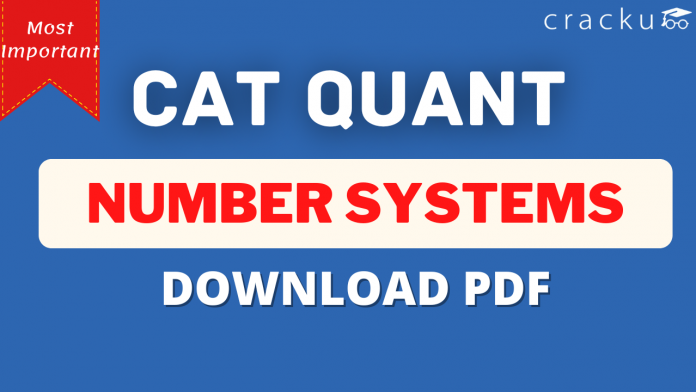CAT Number System Questions [Download PDF]
The Number System is one of the key topics in the CAT Quant Section. If you’re not very strong in this topic, it is essential that you know the basics of the CAT Number System. Also, do check out all the Number System questions from the CAT Previous Papers with detailed video solutions. This article will look into some important Number System questions for the CAT Exam. If you want to practice these important Number System questions for CAT, you can download the PDF, which is completely Free.
Download Number System Questions for CAT PDF
Question 1: Suppose n is an integer such that the sum of digits on n is 2, and $10^{10} < n < 10^{11}$. The number of different values of n is
a) 11
b) 10
c) 9
d) 8
1) Answer (A)
Solution:
The sum of digits should be 2. The possibilities are 1000000001,1000000010,10000000100,..these 10 cases . Also additional 1 case where 20000000000. Hence option A .
Question 2: Each family in a locality has at most two adults, and no family has fewer than 3 children.
Considering all the families together, there are adults than boys, more boys than girls, and more girls than families.
Then the minimum possible number of families in the locality is
a) 4
b) 5
c) 2
d) 3
2) Answer (D)
Solution:
Consider 3 family. Let 1st one have 2 A , 1B and 2 G , 2nd one have 2 A , 2B and 1 G, 3rd one have 2 A , 2B and 1 G . SO total A-6 , B – 5 , g – 4 , F – 3 . Hence minimum is 3 .
Question 3: The remainder, when $(15^{23} + 23^{23})$ is divided by 19, is
a) 4
b) 15
c) 0
d) 18
3) Answer (C)
Solution:
The remainder when $15^{23}$ is divided by 19 equals $(-4)^{23}$
The remainder when $23^{23}$ is divided by 19 equals $4^{23}$
So, the sum of the two equals$(-4)^{23}+(4)^{23}=0$
Question 4: In NutsAndBolts factory, one machine produces only nuts at the rate of 100 nuts per minute and needs to be cleaned for 5 minutes after production of every 1000 nuts.
Another machine produces only bolts at the rate of 75 bolts per minute and needs to be cleaned for 10 minutes after production of every 1500 bolts. If both the machines start production at the same time, what is the minimum duration required for producing 9000 pairs of nuts and bolts?
a) 130 minutes
b) 135 minutes
c) 170 minutes
d) 180 minutes
4) Answer (C)
Solution:
Machine A takes 15 min to produce 1000 nuts with clean time. machine b takes 30 min to make 1500 nuts with clean time . So B is slower. So with B 900 nuts will be made in 180 mins but at last round cleaning time of 10 min no need to count hence 170 mins
Question 5: The total number of integers pairs (x, y) satisfying the equation x + y = xy is
a) 0
b) 1
c) 2
d) None of the above
5) Answer (C)
Solution:
xy = x + y
=> xy – x – y = 0
=> xy – x – y + 1 = 1
=> (x – 1) (y – 1) = 1
=> Both x – 1 and y – 1 have to be equal to 1 or -1.
So, values taken by (x,y) are (2,2) and (0,0).
=> 2 solutions
Checkout: CAT Free Practice Questions and Videos
Question 6: If a/b = 1/3, b/c = 2, c/d = 1/2 , d/e = 3 and e/f = 1/4, then what is the value of abc/def ?
a) 3/8
b) 27/8
c) 3/4
d) 27/4
e) 1/4
6) Answer (A)
Solution:
a/d = a/b * b/c * c/d = 1/3 * 2 * 1/2 = 1/3
Similarly, b/e and c/f are 3 and 3/8 respectively.
b/e = b/c*c/d*d/e = 3
c/f = c/d*d/e*e/f = 3/8
=> Value of abc/def = 1/3 * 3 * 3/8 = 3/8
Question 7: What are the values of x and y that satisfy both the equations?
$2^{0.7x} * 3^{-1.25y} = 8\sqrt{6}/27$
$4^{0.3x} * 9^{0.2y} = 8*81^{1/5}$
a) x = 2, y = 5
b) x = 2.5, y = 6
c) x =3, y = 5
d) x = 3,y = 4
e) x = 5,y = 2
7) Answer (E)
Solution:
$2^{0.7x} * 3^{-1.25y} = 8\sqrt{6}/27$ => $2^{0.7x} * 3^{-1.25y}$ = $2^{3.5} * 3^{-2.5}$
=> 0.7x = 3.5 => x = 5
=> -1.25y = -2.5 => y = 2
$4^{0.3x} * 9^{0.2y} = 8*81^{1/5}$ => $2^{0.6x} * 3^{0.4y}$ = $2^3 * 3^{0.8}$
=> 0.6x = 3 => x = 5
=> 0.4y = 0.8 => y = 2
=> (5,2) is the solution.
Question 8: The sum of four consecutive two-digit odd numbers, when divided by 10, becomes a perfect square. Which of the following can possibly be one of these four numbers?
a) 21
b) 25
c) 41
d) 67
e) 73
8) Answer (C)
Solution:
Maximum sum of the four numbers <= 384=99+97+95+93
384/10 = 38.4
So, the perfect square is a number less than 38.4
The possibilities are 36, 25, 16 and 9
For the sum to be 360, the numbers can be 87, 89, 91 and 93
The sum of four consecutive odd numbers cannot be 250
For the sum to be 160, the numbers can be 37,39,41 and 43
The sum of 4 consecutive odd numbers cannot be 90
So, from the options, the answer is 41.
Question 9: The number of employees in Obelix Menhir Co. is a prime number and is less than 300. The ratio of the number of employees who are graduates and above, to that of employees who are not, can possibly be:
a) 101:88
b) 87:100
c) 110:111
d) 85:98
e) 97:84
9) Answer (E)
Solution:
The addition of numerator and denominatpr should give a prime no. Only option E gives that.
3 is a factor of 189 and 183 => A and D eliminated
17 is a factor of 187 and 221 => B and C eliminated
181 is prime.
Checkout: CAT Free Practice Questions and Videos
Question 10: If R = $(30^{65}-29^{65})/(30^{64}+29^{64})$ ,then
a) $0<R\leq0.1$
b) $0.1<R\leq0.5$
c) $0.5<R\leq1.0$
d) $R>1.0$
10) Answer (D)
Solution:
$\frac{(30^{65}-29^{65})}{(30^{64}+29^{64})} = ((30-29)*\frac{(30^{64}+30^{63}*29+….+29^{64})}{(30^{64}+29^{64})}$ , which is greater than 1 . Hence option D.
Question 11: If x = $(16^3 + 17^3+ 18^3+ 19^3 )$, then x divided by 70 leaves a remainder of
a) 0
b) 1
c) 69
d) 35
11) Answer (A)
Solution:
We know that x = $16^3 + 17^3 + 18^3 + 19^3 = (16^3 + 19^3) + (17^3 + 18^3)$
= $(16 + 19)(16^2 – 16 * 19 + 19^2) + (17 + 18)(17^2 – 17 * 18 + 18^2)$ = 35 × odd + 35 × odd = 35 × even = 35 × (2k)
=> x = 70k
=> Remainder when divided by 70 is 0.
Question 12: Let $n!=1*2*3* …*n$ for integer $n \geq 1$.
If $p = 1!+(2*2!)+(3*3!)+… +(10*10!)$, then $p+2$ when divided by 11! leaves a remainder of
a) 10
b) 0
c) 7
d) 1
12) Answer (D)
Solution:
According to given condiiton we have p = (1 × 1!) + (2 × 2!) + (3 × 3!) + (4 × 4!) + … + (10 × 10!) . So n × n! = [(n + 1) – 1] × n! = (n + 1)! – n!. So equation becomes p = 2! – 1! + 3! – 2! + 4! – 3! + 5! – 4! +… + 11! – 10!. So p = 11! – 1! = 11! – 1. p + 2 = 11! + 1 .So when it is divided by 11! gives a remainder of 1. Hence, option 4.




![CAT Averages Questions PDF [Important Questions] CAT AVERAGES Questions PDF](https://cracku.in/blog/wp-content/uploads/2022/07/CAT-AVERAGES-Questions-PDF-218x150.png)
